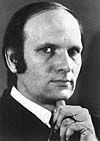John Robert Schrieffer
| Naissance | |
|---|---|
| Décès | |
| Sépulture |
Greenwood Cemetery (d) |
| Nationalité | |
| Formation |
Université de l'Illinois à Urbana-Champaign (doctorat) (jusqu'en ) Massachusetts Institute of Technology Eustis High School (en) |
| Activités |
| A travaillé pour |
Université d'État de Floride (- Laboratoire national de Los Alamos (- Université de Californie à Santa Barbara (- Exxon Research & Engineering Company (d) (- Université de Pennsylvanie (- Université de l'Illinois à Urbana-Champaign (- Université de Chicago (- Université de Birmingham |
|---|---|
| Membre de | |
| Maître | |
| Directeur de thèse | |
| Distinctions |
John Robert Schrieffer (né le à Oak Park dans l'Illinois et mort le à Tallahassee en Floride[1]) est un physicien américain.
Leon Neil Cooper, John Bardeen et lui sont colauréats du prix Nobel de physique de 1972 pour leurs travaux sur la supraconductivité[2].
Biographie
[modifier | modifier le code]John Robert Schrieffer naît à Oak Park dans l'Illinois. Sa famille se déplace à New York puis à Eustis en Floride où il fait ses études secondaires. Il est ensuite admis au Massachusetts Institute of Technology où il étudie d'abord l'ingénierie électrique puis se tourne vers la physique. Il rejoint l'université de l'Illinois à Urbana-Champaign, il y devient l'assistant de John Bardeen.
À partir de sa troisième année à Urbana-Champaign, Schrieffer travaille avec Bardeen et Leon Neil Cooper, ensemble ils mettent au point la théorie qui porte leurs noms, la théorie BCS, la première théorie microscopique complète de la supraconductivité. Ce travail est récompensé par le prix Nobel de physique de 1972 « pour leur théorie commune de la supraconductivité, habituellement appelée théorie BCS[2] ».
Il reçoit en 1968 le Prix Oliver E. Buckley décerné par l'American Physical Society.
Il a été condamné à deux ans de prison en pour avoir causé un accident de voiture tuant une personne alors qu'il était sous le coup d'une suspension de permis[3]. Son épouse est décédée en 2013.
Notes et références
[modifier | modifier le code]- (en) « Nobel Prize-Winning Physicist Schrieffer Dies in Florida », sur U.S.News, (consulté le )
- (en) « for their jointly developed theory of superconductivity, usually called the BCS-theory » in Personnel de rédaction, « The Nobel Prize in Physics 1972 », Fondation Nobel, 2010. Consulté le 16 juin 2010
- (en) Incarcération de Schrieffer
Liens externes
[modifier | modifier le code]- (en) Biographie sur le site de la fondation Nobel (le bandeau sur la page comprend plusieurs liens relatifs à la remise du prix, dont un document rédigé par la personne lauréate — le Nobel Lecture — qui détaille ses apports)
- Notices dans des dictionnaires ou encyclopédies généralistes :
- Ressources relatives à la recherche :
Text is available under the CC BY-SA 4.0 license; additional terms may apply.
Images, videos and audio are available under their respective licenses.

